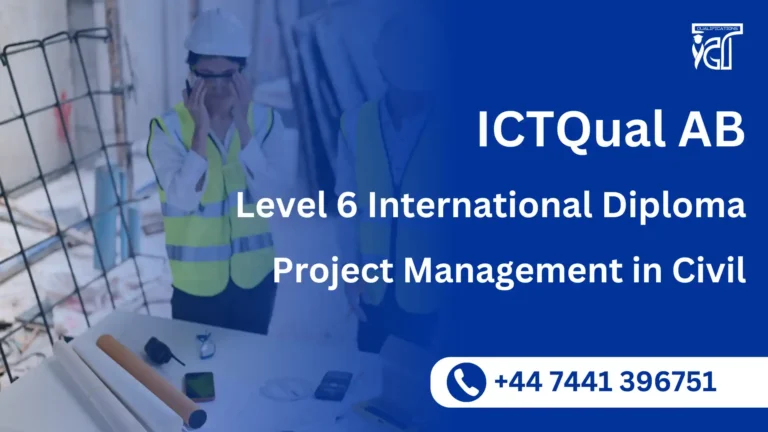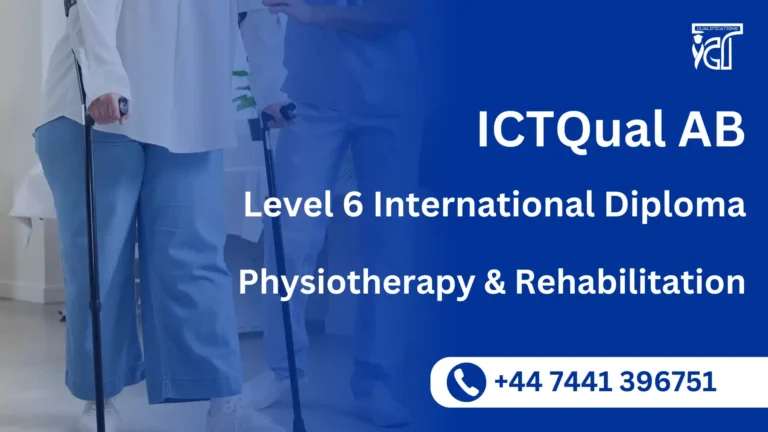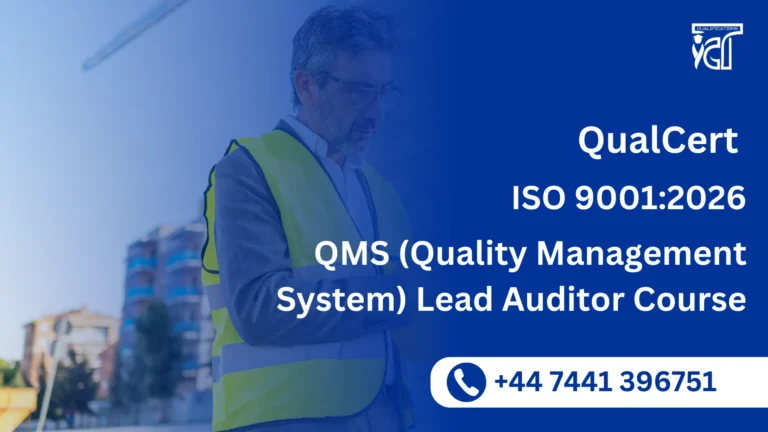In a business landscape driven by performance, consistency, and customer trust, maintaining high standards of quality is no longer optional—it’s essential. Quality Control (QC) professionals play a critical role in ensuring that products and processes meet regulatory and industry standards. The QualCert Level 6 Diploma in Quality Control (QC) is an advanced, Ofqual-regulated qualification tailored for experienced professionals aiming to deepen their expertise and take on leadership responsibilities within quality assurance environments.
This diploma equips learners with the strategic, technical, and analytical skills needed to lead quality control systems, manage regulatory compliance, and foster a culture of continuous improvement across industries.
The QualCert Level 6 Diploma in Quality Control (QC) bridges the gap between mid-level operational roles and senior quality leadership positions. Through a structured, assignment-based approach, learners will explore the design, implementation, and monitoring of robust quality systems in sectors such as manufacturing, pharmaceuticals, engineering, logistics, and food production.
The course is delivered online, offering flexibility for professionals who want to study while managing work and life commitments. Learners benefit from tutor guidance, interactive content, and practical assessments designed to simulate real-world challenges.
The QualCert Level 6 Diploma in Quality Control (QC) is an advanced, internationally respected program designed to prepare professionals for high-impact roles in quality assurance and management. With its flexible delivery, practical focus, and strategic depth, this qualification provides the skills, knowledge, and recognition you need to lead quality initiatives and drive continuous improvement in your organization.
Invest in your future—enroll today and take the next step toward becoming a quality leader.
QualCert Level 6 Diploma in Quality Control (QC)
This QualCert Level 6 Diploma in Quality Control (QC) course offers 120 Credits, requiring a Total Qualification Time (TQT) of 1200 hours, including 600 Guided Learning Hours (GLH). It is designed for efficient and focused skill development in Quality Control (QC).
| Unit Ref# | Unit Title | Credit | GLH | TQT |
| QC01012 – 1 | Advanced Project Quality Management | 20 | 100 | 200 |
| QC01012 – 2 | Global Standards and Regulatory Compliance | 20 | 100 | 200 |
| QC01012 – 3 | Quality Control in Geotechnical Engineering | 20 | 100 | 200 |
| QC01012 – 4 | Quality Control in Building Construction | 20 | 100 | 200 |
| QC01012 – 5 | Innovations in Construction Testing and Materials | 20 | 100 | 200 |
| QC01012 – 6 | Strategic Management in Quality Assurance | 20 | 100 | 200 |
GLH (Guided Learning Hours) and TQT (Total Qualification Time) are terms commonly used in vocational qualifications to help define the amount of time a learner is expected to spend on their studies.
1. GLH (Guided Learning Hours)
GLH refers to the number of hours a learner spends being directly taught, supervised, or supported during their course. This includes the time spent in activities such as:
- Classroom instruction
- Practical workshops
- One-on-one tutoring or mentoring sessions
- Online learning sessions with tutor support
In other words, GLH represents the time that learners are actively engaged with their instructors or learning activities.
2. TQT (Total Qualification Time)
TQT represents the total amount of time a learner is expected to invest in completing a qualification, including:
- GLH (Guided Learning Hours): Time spent on direct learning, as explained above.
- Self-Directed Learning: This includes time spent on independent study, research, assignment completion, preparation for exams, and any other work the learner does outside of direct teaching hours.
TQT is a broader measure that includes all the time required to achieve the qualification. It helps learners and employers understand the overall commitment required for the qualification.
Key Differences Between GLH and TQT:
- GLH focuses on direct learning with guidance or supervision.
- TQT includes GLH as well as independent study time and other learning-related activities.
Example:
If a qualification has a TQT of 600 hours and a GLH of 250 hours, it means the learner should spend 250 hours in direct learning (classroom, online, or tutor-led sessions) and 350 hours on independent study or research.
Upon successful completion of the Level 6 Diploma in Quality Control, students will be able to:
- Advanced Project Quality Management
- Develop a deep understanding of advanced quality management principles in project settings.
- Apply advanced techniques to manage quality in complex projects across various industries.
- Design and implement effective quality management plans and strategies.
- Use tools and methodologies like Six Sigma and Lean to improve project quality and efficiency.
- Assess project quality risks and develop mitigation strategies to ensure successful project completion.
- Global Standards and Regulatory Compliance
- Gain knowledge of international quality standards such as ISO, ASTM, and other global regulatory frameworks.
- Understand the role of regulatory compliance in quality assurance and control across different industries.
- Apply global quality standards to ensure products and services meet legal and customer requirements.
- Evaluate and manage the risks associated with non-compliance and its impact on operations.
- Integrate regulatory compliance into quality management systems and business processes.
- Quality Control in Geotechnical Engineering
- Understand the importance of quality control in geotechnical engineering projects.
- Apply quality control techniques to assess and monitor soil, foundation materials, and geotechnical structures.
- Develop and implement effective testing procedures for geotechnical materials.
- Assess environmental and safety considerations in geotechnical quality management.
- Ensure compliance with quality standards in geotechnical design and construction practices.
- Quality Control in Building Construction
- Master quality control practices specifically applicable to building construction projects.
- Implement quality assurance procedures throughout the lifecycle of building projects, from design to completion.
- Use inspection and testing techniques to ensure materials and workmanship meet quality standards.
- Identify common quality issues in construction and develop strategies for resolution.
- Ensure compliance with building codes, safety standards, and industry regulations in construction quality management.
- Innovations in Construction Testing and Materials
- Stay up-to-date with the latest innovations in construction materials and testing technologies.
- Assess the impact of new materials on quality control processes in construction.
- Understand advanced testing methods used for evaluating construction materials and structures.
- Apply innovative testing techniques to improve the accuracy and efficiency of quality control.
- Analyze how innovations in construction materials can contribute to more sustainable and cost-effective construction practices.
- Strategic Management in Quality Assurance
- Gain an understanding of strategic management principles within the context of quality assurance.
- Develop and implement quality assurance strategies aligned with organizational goals and objectives.
- Evaluate and improve the effectiveness of quality management systems from a strategic perspective.
- Lead teams in the development and execution of long-term quality improvement initiatives.
- Assess the role of leadership and organizational culture in fostering a commitment to quality at all levels of the organization.
Benefits of the QualCert Level 6 Diploma in Quality Control (QC)
The QualCert Level 6 Diploma in Quality Control (QC) is an advanced, Ofqual-regulated qualification designed for professionals seeking to elevate their expertise in quality assurance and operational excellence. Here are the top benefits of enrolling in this highly regarded program:
1. Ofqual-Regulated and Globally Recognised
This diploma is accredited by Ofqual, the UK government’s qualifications regulator. It ensures the qualification is credible, meets high academic standards, and is recognised by employers and institutions across the globe.
2. Designed for Advanced Professional Development
This Level 6 diploma bridges the gap between technical QC roles and leadership positions. It’s ideal for professionals aiming to transition into senior quality control, compliance, or quality management roles.
3. 100% Assignment-Based – No Exams
Learners are assessed through practical, work-based assignments, making it a more flexible and relevant option for professionals who prefer to apply knowledge in real-world contexts rather than sit for traditional exams.
4. Flexible Online Study Format
The course is delivered entirely online, allowing you to study at your own pace, around your current job or personal commitments. This makes it ideal for busy professionals seeking career advancement without compromising work-life balance.
5. In-Depth Industry-Relevant Content
The curriculum covers critical topics such as quality systems implementation, ISO standards, risk management, auditing, and continuous improvement, ensuring you gain actionable skills that can be applied across multiple industries.
6. Boosts Career Opportunities and Earning Potential
Completing a Level 6 diploma significantly improves your chances of qualifying for higher-level roles such as Quality Manager, Compliance Lead, QC Analyst, or Operations Supervisor, with greater responsibilities and better salary prospects.
7. Foundation for Higher-Level Certifications
This diploma serves as a strong stepping stone to even more advanced qualifications, such as the Level 7 Diploma in Quality Control, ISO Lead Auditor certification, or Lean Six Sigma Black Belt.
8. Practical Leadership and Management Skills
You’ll learn how to lead quality teams, manage quality-related change, and influence business strategy—skills that are crucial for professionals in or moving toward leadership roles.
9. Improved Analytical and Problem-Solving Abilities
The course trains you to use quality tools such as FMEA, 5 Whys, and Pareto analysis to solve problems, enhance processes, and drive operational efficiency.
10. Applicable Across Multiple Industries
Whether you work in manufacturing, engineering, pharmaceuticals, logistics, or food production, the skills you gain are transferable and in demand across sectors that prioritize quality and compliance.
By enrolling in the QualCert Level 6 Diploma in Quality Control (QC), you invest in your ability to lead quality initiatives, enhance organizational performance, and accelerate your career in a high-demand field.
The Level 6 Diploma in Quality Control (QC) is designed for professionals and individuals who are seeking to advance their expertise and take on senior roles in the field of quality management. This course is particularly suited for:
1. Senior Quality Control Professionals
- Quality Control Managers: Individuals currently managing quality control departments who want to deepen their knowledge and strategic capabilities.
- Senior Quality Assurance Officers: QA professionals looking to broaden their understanding of advanced QC methodologies and take on more strategic responsibilities.
2. Mid-Level and Upper-Level Managers
- Operations and Production Managers: Managers overseeing manufacturing or production processes who need to implement and maintain advanced quality control systems.
- Department Heads: Leaders of various departments who wish to integrate quality management principles into their operational strategies.
3. Industry Professionals
- Manufacturing Sector Employees: Professionals working in industries where maintaining high-quality standards is critical for product integrity and customer satisfaction.
- Pharmaceutical and Healthcare Professionals: Those in sectors where strict quality standards are mandatory to ensure safety, efficacy, and regulatory compliance.
- Food and Beverage Industry Workers: Quality control personnel in the food industry who need to ensure products meet stringent health and safety standards.
4. Entrepreneurs and Business Owners
- Small Business Owners: Entrepreneurs running small to medium-sized enterprises who want to implement robust quality control measures to improve product quality and customer satisfaction.
- Start-Up Founders: Individuals in start-ups, especially in production or manufacturing, who need advanced knowledge in quality control to build their business on solid quality principles.
5. Regulatory and Compliance Personnel
- Compliance Officers: Professionals responsible for ensuring their organizations comply with industry regulations and standards.
- Regulatory Affairs Specialists: Individuals tasked with navigating and implementing regulatory requirements related to quality control.
6. Continuous Improvement Enthusiasts
- Lean and Six Sigma Practitioners: Individuals trained in Lean and Six Sigma methodologies who want to expand their knowledge in quality control to enhance process improvement initiatives.
- Continuous Improvement Managers: Professionals dedicated to fostering a culture of continuous improvement within their organizations.
7. Academic and Training Institutions
- Educators and Trainers: Individuals teaching quality control courses who seek formal qualifications to enhance their teaching credentials.
8. Career Switchers
- Professionals from Related Fields: Individuals from related fields such as engineering, production, or operations who wish to transition into quality control and need advanced training and certification.
9. Strategic Leaders
- C-Level Executives and Directors: Senior executives who want to ensure that quality management is an integral part of the organizational strategy and culture.
- Policy Makers and Consultants: Individuals involved in creating policies or providing consultancy services related to quality management and control.
Entry Requirements
Register Now
Qualification Process
Qualification Process for the QualCert Level 6 Diploma in Quality Control (QC)
- Self-Assessment:
Begin by evaluating your eligibility to ensure you meet the qualification requirements, including work experience, knowledge, and language proficiency. - Registration:
Complete your registration by submitting the required documents, including a scanned copy of a valid ID, and paying the registration fee. - Induction:
An assessor will conduct an induction to confirm your eligibility for the course and explain the evidence requirements. If you do not meet the criteria, your registration will be canceled, and the fee will be refunded. - Assignmnets & Evidence Submission:
Provide all assignmnets and the necessary evidence based on the assessment criteria outlined in the course. If you are unsure of the required evidence, consult with the assessor for guidance on the type and nature of evidence needed. - Feedback and Revision:
The assessor will review your submitted evidence and provide feedback. Evidence that meets the criteria will be marked as “Criteria Met,” while any gaps will be identified. You will be asked to revise and resubmit if needed. - Competence Evidence:
Submit final evidence demonstrating that all learning outcomes have been met. This evidence will be marked as “Criteria Met” by the assessor once it is satisfactory. - Internal Quality Assurance (IQA):
The Internal Quality Assurance Verifier (IQA) will review your evidence to ensure consistency, quality, and compliance with standards. - External Verification:
The IQA will submit your portfolio to QualCert External Quality Assurance Verifiers (EQA) for final confirmation. The EQA may contact you directly to verify the authenticity of your evidence. - Certification:
Upon successful completion of all checks, QualCert will issue your official certificate, confirming that you have attained the QualCert Level 6 Diploma in Quality Control (QC).







